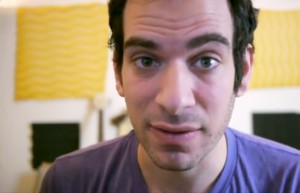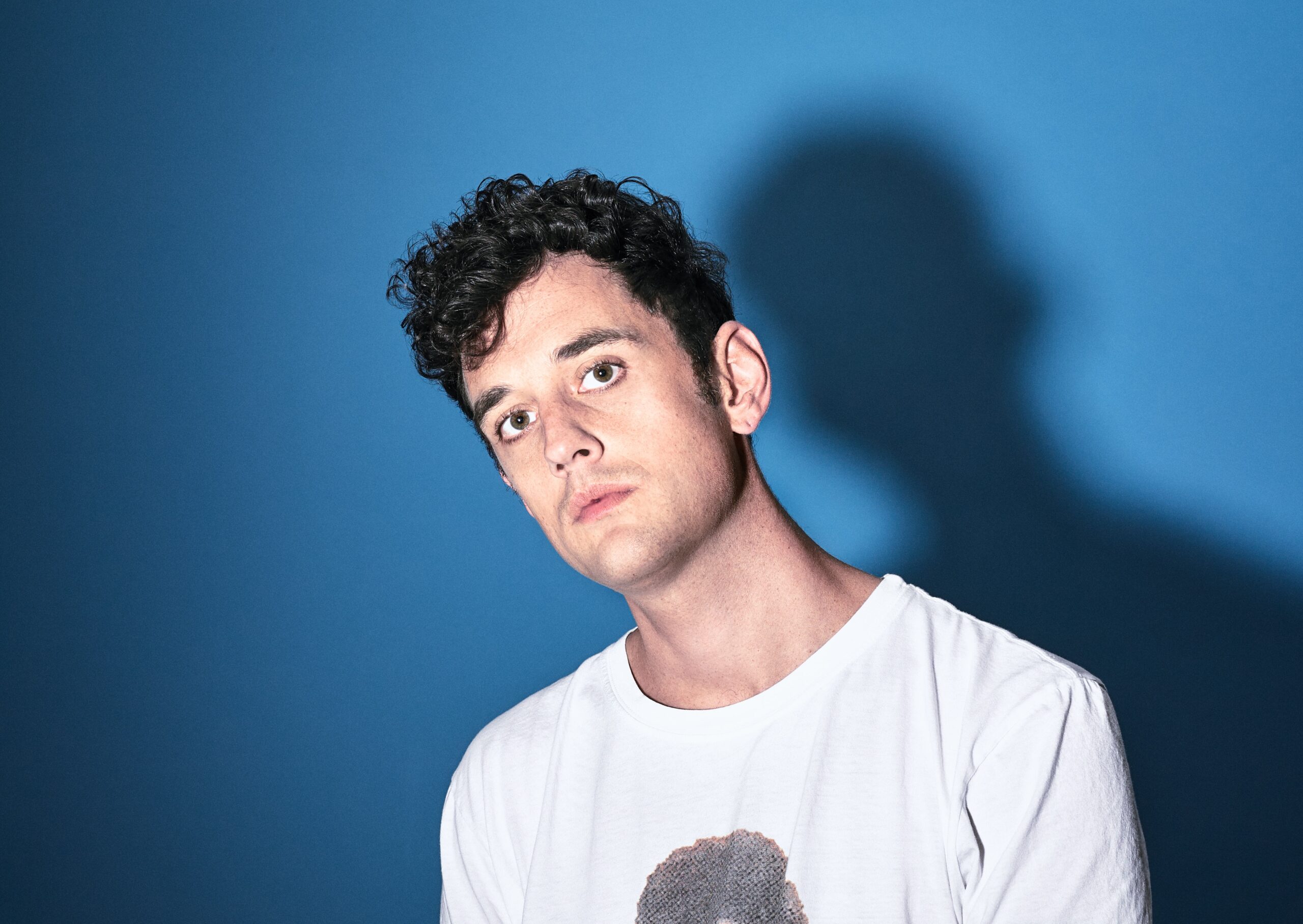
Jonathan Mann, on Songwriting and YouTube
Jonathan Mann is a singer/songwriter who has been writing and recording one song per day since January 1, 2009 for his Song A Day project. For over 1,000 days, he has been posting a daily – usually humorous – song to YouTube that touches upon news and current events. A graduate of Bennington College in Vermont, Jonathan started playing guitar and writing songs when he was inspired by the music of Bob Dylan at age 12. Song A Day has earned him a great deal of press attention and brought him a number of interesting collaborative projects. He has appeared on The Rachel Maddow Show and has been commissioned to write songs for companies including Apple, TechCrunch, Dobly, ChaCha, Cisco, Microsoft, Groupon and AirBnB. Last spring, he used the crowdfunding site Kickstarter to raise $13,000, which funded his record Song A Day: The Album.

I got to talk to Jonathan about how he started in music, techniques that help him continue to be a prolific artist and how other musicians can leverage YouTube and other online and offline tools to get their music heard, find opportunities for collaboration and grow their fan bases.
Musician Coaching:
Thanks so much for taking the time to talk to me, Jonathan. How did you become a musician?
JM:
I started playing guitar when I was 12, about 13-14 years ago. And, as happens when you’re just on the cusp of being a teenager, you get really intense about something. The thing I got really intense about was Bob Dylan. I had grown up listening to his music because my parents always listened to it. But, whatever happens at that point in a teenage mind, happened in mind. Something clicked, and it seems like overnight I started to really hear him for the first time. Basically, from that moment forward, I knew I wanted to write songs like him.
As soon as I started playing guitar, I started writing songs. And all those early songs sounded like a 12-year old trying to write songs like Bob Dylan, and not particularly well. But I really learned song structure from him. He has a way with words, to put it mildly. And his lyrics have this opaqueness; the meaning isn’t always obvious in some of my favorite songs of his. The words and the music together just create an overall feeling.
I continued to write songs and did a bunch of other things along the way. I went to college at a small liberal arts school in southern Vermont called Bennington College, which was a very hippy-dippy kind of place, and I really loved it. But I always found myself struggling with wanting to write more songs. People often describe what writer’s block feels like, and I realized that’s really what I was experiencing. What was so awful about writer’s block was that it wasn’t that I didn’t feel like creating and therefore wasn’t creating; it was that I had this creative impulse and wanted to be making music. But I would sit down and try to write, and I couldn’t. So, it wasn’t that the desire was there. The strong desire was actually what made it so awful when the songs just weren’t coming.
It’s all in hindsight of course that I recognize the problems. But, I started coming up with ways to force myself to write. One of the early techniques I came up with was in college. A friend of mine came up with a silly idea. We sat down one night with a little cassette recorder and had a couple beers. And we decided we were going to write 40 songs that night, and that each song would be only 40-seconds long. We had a stopwatch to time each other so we could make sure we didn’t go over the time limit. And we decided that wherever we were in the song after 40 seconds, we would stop and move onto the next song.
Musician Coaching:
Did that help with writer’s block, and did anything real come out of those “40 in 40”?
JM:
Absolutely. Out of those 40 songs, what I noticed was that three or four of them ended up being the germs of really great songs. In fact, we fleshed out one or two of them, and they ended up being really big hits around campus – songs that people really responded to when we played them live. In my career so far with songwriting, the experience of that night has really stuck in my mind.
Also, in college, another friend of mine and I wrote a rock opera. Looking back, I can see clearly that writing this rock opera was really just a way to keep myself writing songs, because it was a way to not start from scratch. A lot of times you’re sitting down to write a song. And you might be starting with a feeling or something else, but mostly you’re just sitting there with a blank page.
Musician Coaching:
And by that, do you mean that the rock opera gave you some kind of container or some constraints, so your choices became less infinite?
JM:
That’s exactly it. In this instance, we had written out a story together collaboratively about a race of aliens. The story had all these points and beats that needed songs. And so, it was the constraint of, “Here are the topics you need to write songs about. Now, go do it.” We both ended up writing about 20 songs apiece in a matter of weeks because we had this opera to focus on.
I did more of this rock opera writing in college. And it became really clear to me that all these exercises were simply constraints I was putting on myself in order to keep me writing songs and keep me happy. I realized I was happiest when I was creating a lot. And what better way to create a lot than to put the blinders on and get a bit myopic – focus in on something so songs would come more easily?
Musician Coaching:
I can imagine these techniques have continued to help you. Are you still doing the Song A Day project?
JM:
Yes. And I’ve created well over 1,000 songs now. As of today, I’m at 1,063.
Musician Coaching:
And you’ve literally written a song and put it up on YouTube every day for 1,063 days?
JM:
That’s right. And Song A Day came later. Looking back on all the different things I’ve done, it’s almost funny to me that I didn’t hit upon it sooner, because it seems so obvious now. To tell you the truth, I thought about writing a song a day before. I got a flyer in late 2008 for this project called Fun-a-Day. And Fun-a-Day is an art project on the Internet and in the real world, where artists of all stripes, sizes and shapes are invited to create a piece of art for every day of January. And people do all kinds of things, from sculpture, to painting, to poems. And they also do more outlandish things, like performance art and any kind of offbeat art you can imagine. This project has been going on for eight years for the entire month of January. And then, at the end of January, everyone gets together in different regions throughout the world: There’s a gathering in the Bay Area and one in Philadelphia, Berlin, etc. They have a big art show where everyone shows off their work in a gallery. Musicians can perform, and it’s really cool.
So, I got a flyer for this project, and it became the seed for Song A Day. At the end of January, I was having such a great time with it, that I didn’t see any reason to stop. I reached 100 songs, and felt I had to keep going. I realized that for me, it was the ideal way for me to keep myself creative.
Musician Coaching:
And you mentioned a 70-20-10 rule: 70% of songs are so-so, 20% are not so hot and 10% are really good. Has that held true through the thousands of songs you’ve made?
JM:
I would say that’s definitely been the case. I think that holds true for most artists. It was something I noticed early on with the 40-second songs, the various rock opera projects and even the times I tried to put together albums. I would have a collection of songs, and that would be the ratio. Out of 10 songs, maybe one or two are stellar. Another few of them are filler. And the rest fall somewhere in between – not terrible and not great. And it seems that rule holds true for almost anything creative.
Of course there’s a caveat to that. It can also be really difficult to tell which songs fall into which category.
Musician Coaching:
I was going to ask you that. There were probably songs that – had you not started the Song A Day project – would’ve never see the light of day. Have you been surprised by really positive reactions to songs you thought weren’t as good as others, or by lack of response to songs that you thought were really great?
JM:
I’ll answer that in two ways. In one way, I’ve definitely been really surprised. But one thing I’ve learned from doing this in public is, even a song that nine out of ten people dislike and that you yourself dislike as the creator, there’s going to be someone somewhere that responds to it really positively. I think that’s just human nature and shows the range of people’s tastes.
But, at the same time, I’m so wrapped up in it, and the songs go by so quickly. When I’m working on a song, it’s very rare that I think, “This is a crappy song.” As a songwriter, if you have that feeling, you go in another direction to make the song less crappy. So, I’d say that while you’re working on the thing, you’re never thinking about how bad it is.
Musician Coaching:
Well, in my experience – and mind you, I’ve written considerably fewer songs than you – I would lay something down and revisit it the next day and think, “Boy, what was I thinking?” But you really don’t have the time to reflect on that, because it’s up and live.
JM:
Yeah. And I’ve had that experience and the reverse of that experience. I’ve laid something down and liked it and then the next day, not liked it. And I’ve also laid something down and really disliked it, then the next day have realized I’m really excited about it.
The other thing that’s really struck me with Song A Day is all the songs I’ve written that would’ve not seen the light of day had I not been doing this project. It’s a weird idea to me that I have all these songs that exist inside of me. And once or twice a week, I’ll write something that just comes out, and I think, “Where did that come from? I’m so glad I’m doing Song A Day, because now I have this song that I’m really into.” It only strengthens my resolve to keep doing it. If I stop, it just means there will be more songs I’ll never write.
Musician Coaching:
I’m sure you have a lot of fellow musician friends. One of the most common complaints I get from musicians when I suggest that they create music, video and content as regularly as possible around their music is, people want everything to be really polished and clean. I can’t imagine in turning out the volume you have that all the performances have been completely tight. Still, you’ve had success with this project and feel good about it. Have you found that when you’re constantly generating material, people forget the songs that are not good and gravitate towards the ones that are? How has your experience been different from the experience of so many of these other musicians?
JM:
It’s hard for me to say. On the one hand, I would definitely say that I think material that is polished is great. But I think the idea that everything you put out needs to be polished is a little bit overrated. Like you said, people will ignore things they don’t like, and gravitate towards things they do like.
I’ve had a lot of success with Song A Day, namely through people finding me and asking me to come on TV shows or come play conferences. They’ve wanted to collaborate on projects with me just because of the fact that I’m out there all the time. But on the other hand, my overall audience has remained relatively small. And I think part of that may be due to over saturation.
Musician Coaching:
Well, and it seems like it’s hard to say. Most people struggle to get an audience at all. The average musician out there has friends, family and occasionally a really keen supporter or two who brings out his/her friends and extended friends every once in a while. But most people don’t have an audience. The vast majority of musicians out there are aspiring and don’t have a real fan base. But you do.
JM:
That’s definitely very true. So, I guess if you put it into that perspective, what I’ve done and continue to do definitely works. I like to think that I’m on the opposite end of the spectrum from the end most musicians and artists are on. I don’t really have any perfectionism in me. In fact, I almost have none. I would rather do something quickly and get it to be as good as I can get it in that moment and put it out and see what happens rather than spend a lot of time on something. I tend to get tired of a song really quickly when I’m just focusing on it the way I feel a lot of my peers do. Perfectionism has so many strengths to it. But I also think my way has strengths as well. I think a perfectionist can learn from the way I create in the same way that I learn when I collaborate with friends who spend a lot more time on a song. I love that type of collaboration, because it is such a novelty for me and so different.
Musician Coaching:
You started songwriting and getting into music very young, so you’ve been at this a while. Are there some things you wish you’d known going in about online marketing, social media, creating music in general? What have you learned that you feel has made your process more efficient?
JM:
That’s an interesting question. And it’s almost difficult for me to answer, because I’m not sure I really have figured that game out completely.
Musician Coaching:
Well, and I don’t know that anyone has it figured out. It’s all still the Wild West. But were there times you’ve looked back on where you were spinning your wheels, and you’ve thought, “Wow. If I met myself when I was 18, I’d tell myself …”?
JM:
To tell you the truth, I sometimes wish I had started doing the Song A Day earlier, and that I had hit on this process. On the other hand, things work out the way they do for a reason.
One thing I still think I could do better on, and I wish I were more adept at is simply collaborating. I think collaboration is key for musicians. And it’s a whole different ballgame than working by yourself. I’m definitely open to it. I have a lot of musician friends, and whenever we get together and collaborate, it’s always wonderful.
One of the biggest things I’ve observed regarding YouTube is that you have to collaborate. If you want to grow your audience, you find people that you like and that you respect from YouTube, and you reach out to them with a good idea, then collaborate with them and make something. That way, your audience gets to see them, and their audience gets to see you. I started making online video in 2005 right when YouTube started. And had I known that collaboration was one of the biggest tricks on that platform, maybe I would’ve done more of that.
Like you said, it’s still very much the Wild West. And I feel like my particular project is a long game.
Musician Coaching:
I think any projects that are worth having are long term.
JM:
Right. And who knows what new things will come up?
Musician Coaching:
Ever since you and I first connected, I’ve wanted to ask you a question about time management. How do you manage to have a normal life and fit in doing a song and a video a day? I’m sure you’ve had to juggle things around. I know a lot of musicians who would love to be able to do a project like this. Do you have any advice for them about making time?
JM:
It’s definitely a challenge. I’ve been lucky. When I started the project, I was essentially unemployed. I had a small bit of freelance work. As I’ve been continuing the project, the freelance work has become denser. But the nature of freelancing gives me a lot of time to do this.
With any job I’ve had, I’ve always experienced in-between times. And often, the time spent getting to work and coming back from work – all other times like those – I’ve used for idea generation. Any time I’ve been working on songs, a lot of really great ideas have come out of those in-between times. And there are ways to utilize that time to maximum efficiency.
Otherwise, it’s really just about commitment. You just have to commit to doing it. I would also encourage people to do a song a day, even if just for the period of time they do Fun-a-Day. January is coming up. Just challenge yourself to do it for a month. Once you commit yourself to it, it just becomes part of your life. That’s what happened to me. My friends and family know that’s just what I do. So, a lot of times I’ll be around them and say, “Okay, I haven’t done my song yet, and it’s 9 p.m. I have to go do this.” Often, that’s all finding the time is. So often, all I have time to do is sit down with a guitar for 20 minutes and write down the first thing that comes to me.
Musician Coaching:
And sometimes the songs that come out of even that little time are great.
JM:
Exactly. What you do when you do that is set yourself up to make great music. If you do that every day, just by sheer probability, something you make is going to be great.
To learn more about Jonathan and his music (or even to talk to him about collaboration), please visit the official Jonathan Mann website. If you want to check out some of the inspiration behind Jonathan’s Song A Day or get involved in a similar project yourself, take a look at Artclash Collective’s Fun-a-Day project.
Below is a video introduction to Jonathan and Song A Day:






